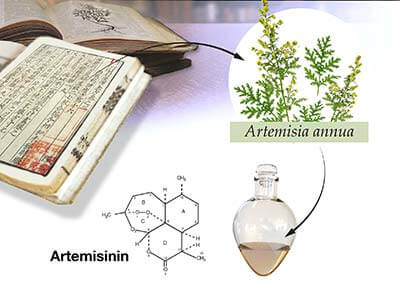
Artemisinin, a compound of sweet wormwood, is among the best treatments for malaria and has produced promising results in cancer trials, but the WHO has sternly warned against using it without a doctor’s recommendation. Read on to learn more.
What is Artemisinin?
Artemisinin is a plant-derived compound, isolated from Artemisia annua (sweet wormwood), an herb employed in Chinese traditional medicine.
This compound (along with its derivative drugs), is part of the World Health Organization’s recommended treatment of uncomplicated malaria caused by Plasmodium falciparum [1].
The drug and its derivatives have been so effective in treating the disease, that Youyou Tu received the Nobel Prize in Physiology or Medicine in 2015 for discovering it [2].
A number of semi-synthetic derivatives were also prepared from this herb for use in malaria treatment programs. The best among them include artemether, artesunate, and artenimol (β-dihydroartemisinin, DHA) [3].
WHO Warnings
The WHO has warned against using uncompounded artemisinin or using artemisinin for any purpose other than malaria treatment, citing the possible disaster that could occur if Plasmodium falciparum developed a resistance to the drug [4].
As such, we strongly recommend against using artemisinin without the express prescription of a medical professional.
Snapshot
Proponents:
- About 90% effective in treating P. falciparum malaria
- Combination treatments with very low risk of resistance
- Some positive clinical studies in cancer patients
- Anti-inflammatory effects in cell & animal studies
Skeptics:
- Side effects might include nausea, dizziness
- Poorly researched outside of malaria
- WHO has warned against using uncompounded artemisinin
Health Benefits of Artemisinin
Effective Against Malaria
According to the WHO, artemisinin is a central part of the most effective treatment for uncomplicated malaria. The malaria parasite, Plasmodium falciparum, is far less likely to develop resistance to treatment when artemisinin is included in combination with other antimalarial drugs; hence, the WHO has recommended the use of artemisinin combination therapies (ACTs) in patients with malaria [4, 5].
Artemisinin is about 90% effective in curing uncomplicated malaria caused by Plasmodium falciparum. However, the widespread use of drug monotherapy has resulted in the development of resistance to malarial parasites [4].
Several combination therapies have shown high efficacy against sexual and asexual stages of both chloroquine resistant and sensitive P. vivax [6].
Artemisinin extracts have antimicrobial activity against periodontopathic microbes like Aggregatibacter actinomycetemcomitans, Fusobacterium nucleatum subsp. animalis, Fusobacterium nucleatum subsp. polymorphum, and Prevotella intermedia [7].
Animal Research (Lacking Evidence)
No clinical evidence supports the use of artemisinin for any of the conditions listed in this section. Below is a summary of the existing animal and cell-based research, which should guide further investigational efforts. However, the studies listed below should not be interpreted as supportive of any health benefit.
1) Inflammation
Artemisinin and its derivatives have shown positive immune and anti-inflammatory effects as well [8].
In lab experiments, they could inhibit IL-1β, IL-6, and IL-8 production from synovial cells of Rheumatoid Arthritis patients [9].
Acetone extract showed the greatest inhibitory effect on lipopolysaccharide-induced nitric oxide (NO), prostaglandin E2 (PGE2) and proinflammatory cytokine [7].
It also suppresses TNF-α expression and T-helper 1 (Th)/Th17 responses in a colitis animal model [10].
At the same time, it could selectively enhance the T-cell function in mice [11].
2) Autoimmune Disease
Artemisinin derivatives were found to significantly improve lupus, multiple sclerosis and allergic disease in mouse models [9, 12, 13, 14].
3) Antiviral Activity
Artemisinin reduced the replication rates of Hepatitis B and C viruses and a range of human herpesvirus [15, 16, 17, 18].
Cancer Research
In one randomized controlled trial, artesunate combined with NP (a chemotherapy regimen of vinorelbine and cisplatin) elevated the short-term survival rate of patients with advanced non-small cell lung cancer (NSCLC) [19, 20].
Long-term treatment of two metastatic uveal melanoma patients with artemisinin in combination with standard chemotherapy showed a significant improvement [21].
Artemether treatment was beneficial in improving the quality of life of a 75-year old male patient with pituitary macroadenoma [22].
Cell Studies
Many substances have anti-cancer effects in cells, including downright toxic chemicals like bleach. This doesn’t mean that they have any medical value. On the contrary, most substances (natural or synthetic) that are researched in cancer cells fail to pass further animal studies or clinical trials due to a lack of safety or efficacy.
Artemisinin and resveratrol possessed a synergistic anti-tumor effect in a cell study [23].
Artemisinin inhibits the growth of gall bladder cell lines (via induction of ROS and cell cycle arrest) [24, 25].
It induced antiproliferative and proapoptotic effects in HPV-39 infected human cervical cancer cells [26].
Mechanism of Effect
In cell studies, artemisinin:
- Activated Nrf2 [27].
- Increased regulatory T Cells and suppressed pro-inflammatory Th17 cells [28].
- Reduced NF-kB activity [29].
Dosage
Because of the WHO’s warnings, we strongly recommend against using artemisinin for any reason without a doctor’s prescription.
During the treatment of malaria, 500 mg of artemisinin per day is typically administered for five days [30].
Side Effects & Safety
Side effects are similar to the symptoms of malaria: nausea, vomiting, anorexia, and dizziness [31].
A rare but serious adverse effect is an allergic reaction [32].
Artemisinin treatment can cause the red blood cells to rupture, particularly in those with predisposing factors for anemia [33].
Other possible adverse side effects can occur from Combination Therapy (ACT), namely hepatitis and delayed hemolytic anemia [34, 35].
To avoid adverse effects and unexpected interactions, only use artemisinin as directed by a medical professional.

